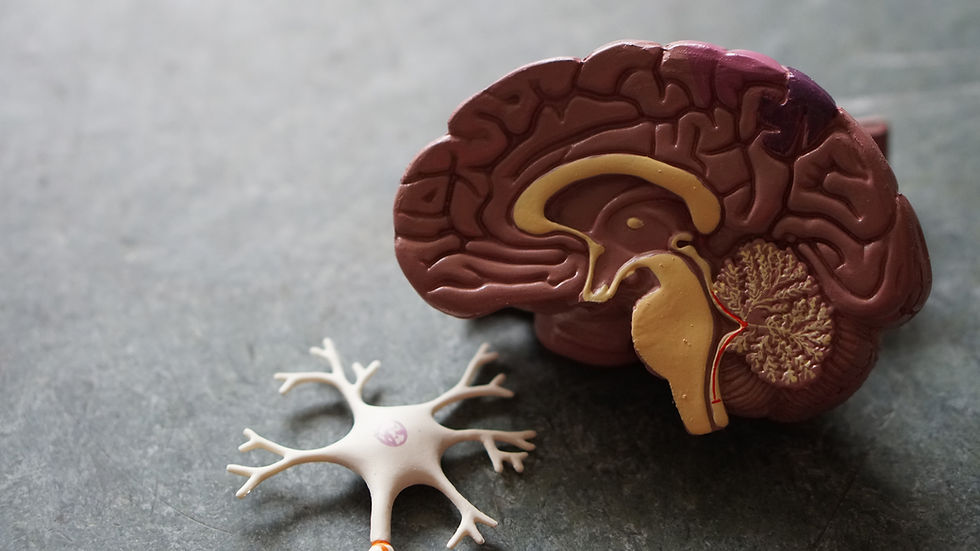Corticobasal Degeneration
- Jud Eson
- Mar 26, 2024
- 3 min read
Corticobasal degeneration (CBD) is a type of atypical parkinsonism. Some researchers will use the term corticobasal syndrome (CBS) instead of CBD, but for the purpose of this post, CBD will be used. We have discussed other forms of parkinsonisms in previous blog posts like progressive supranuclear palsy and vascular parkinsonism. CBD is rare, with 2 out of 100,000 people being currently diagnosed, but it should be discussed in the PD world as people can be incorrectly diagnosed with one or the other. Let's dive in.

CBD and Parkinson's both involve neuronal damage caused by protein accumulation, but it is the protein type that differs between the two. In PD, alpha synuclein is to blame. In CBD, the primary protein that accumulates is tau. This specific protein is also seen in other common disorders such as Alzheimer’s and progressive supranuclear palsy.
Symptoms
CBD is thought to be seen as "asymmetrical parkinsonsism," meaning symptoms like rigidity and dystonia that occur on only one side. Tremor is thought to be less common in people with CBD compared to PD, and is thought to occur with myoclonus. Apraxia, the inability to sequence a complex motor task appropriately, is often common in CBD, as well as changes in a person's sense of space.
"Asymmetrical limb clumsiness" has been described in literature to be one of the most common symptoms at onset. However, when people make it to a neurologist for their first visit, unilateral rigidity, bradykinesia, postural imbalance, and dystonia are more commonly seen.
Just like PD, CBD has motor and non-motor symptoms.
Motor symptoms listed from most common to least common
Limb rigidity
Bradykinesia
Postural instability
Falls
Gait abnormalities
Axial rigidity
Tremor
Limb dystonia
Myoclonus
** About 70% of people experience the first 6 symptoms.
Non-motor symptoms listed from most common to least common
Cognitive impairment - 70% of people experience this symptom
Behavioral changes
Limb apraxia
Aphasia
Depression
Cortical sensory loss
Alien limb
** Roughly half of people with CBD experience symptoms 2-5

Diagnosis
CBD is diagnosed clinically, just like PD. That means, there is no one test to definitively say a person has CBD. The only way to confirm a CBD diagnosis is by an autopsy. However, there is a clinical criteria the medical community uses to help with a diagnosis:
Progressive symptoms over >1 year
>50 years old at onset of symptoms
No resting tremor
No strong response to levodopa
No family history of other disorders
No hallucinations
No autonomic symptoms
Symptoms that include:
At least two of the following:
Asymmetric limb rigidity or Akinesia
Asymmetric limb dystonia
Asymmetric limb myoclonus
AND
At least two two of the following:
Limb or facial apraxia
Sensory deficits
Alien limb phenomena
OR, at least one of the 6 symptoms listed above AND:
At least two two of the following:
Executive dysfunction
Behavioral or personality changes
Visuospatial deficits
OR
Effort speech and at least one item below:
Impaired comprehension of sentence structure
Distorted speech
Treatment
Anticholinergic medications, amantadine, and benzodiazepines can be helpful to treat dystonia, but there are cognitive side effects of these medications that should be considered.
Levetiracetam and clonazepam can be helpful with myoclonus.
Occupational therapists can help with treating apraxia and other cognitive changes.
Speech therapists can help with language and swallowing changes.
Physical therapists can help with any gait changes, general strength and balance, and overall quality of life.
Psychiatrists, psychologists, and mental health counselors can help with any emotional changes.
Unfortunately, there is no cure with CBD so treatments are aimed at treating the symptoms. The average life expectancy for people diagnosed with CBD is eight years. The shortened lifespan for these folks make it really challenging to live well with CBD. Building a strong health care team and a support system will greatly help.
Source:
